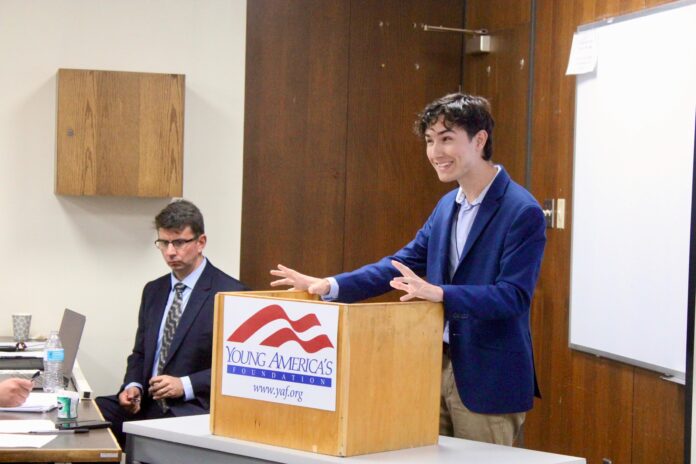Continuing Civil Discourse
Earlier this month, the UD Young Americans for Freedom chapter hosted a student debate centering on the question: “Has Donald Trump’s Foreign Policy Been a Net Positive?” Three students argued in the affirmative, and three students in the negative. After each speaker presentation, students in attendance had the opportunity to ask questions via the moderator of the debate, Dr. Harold.
Beginning the night, Andrew Baca, arguing in the affirmative, addressed two commonly cited criticisms of the President: unpredictability and isolationism. Regarding the former, Andrew proposed that behavior which keeps certain nations guessing is to America’s advantage. If all the cards are on the table, he argued, we have greatly reduced leverage over our enemies. Secondly, Andrew argued that the President is not in fact an isolationist. Rather than abandoning NATO, President Trump has stipulated that our allies in Europe must pay a fair amount towards our shared defense for their sake and ours – a demand which has been heeded.
Seamus Malloy, arguing in the negative, focused on the dangers of American withdrawal overseas. Addressing the topic of isolation and self-interest, Seamus argued that investing money in defense of our allies is not a waste but rather a guarantee of our continued global hegemony. Citing data that certain European nations which depended on American weapons in the past are now opting not to purchase American weapons, Seamus warned that this reduced dependence on the U.S. weakens our influence. Seamus cites reports that the U.S. was not briefed beforehand on the recent Israeli attack on Qatar as evidence of our allies’ reduced trust.
Returning to the affirmative, James Slack posited that the President is neither an isolationist nor an interventionist but a Jacksonian: “Speak softly, but carry a big stick.” While he has avoided committing our troops to endless foreign conflicts, the President has engaged in several rounds of tough negotiations in the Middle East and Eastern Europe. James pointed out that President Trump’s repeatedly proven motivation is to end the suffering of the citizens of Ukraine, Russia and the Holy Land. As an example of this “peace through strength” model, James cited the bombing of Iranian uranium enrichment facilities, an action carried out to prevent nuclear war.
Arguing in the negative, Justin Yang cited the ongoing devastating conflict in Ukraine as evidence of Trump’s ineffective foreign policy . Although the President has claimed that he will bring peace to Russia and Ukraine and has negotiated with the leaders of both nations, the war rages on and — Justin argued — has worsened. Further, Justin warned that with the U.S. curtailing foreign aid, we may end up strengthening our enemies and weakening our international influence. As an example, he mentioned the recent Myanmar earthquake, for which other nations, including China, provided aid. Justin argued that incidents such as this will make nations like Myanmar inclined to turn to adversaries like China instead of to the U.S.
In the affirmative, Beatrice Ellison cited numerous actions of the President towards global peace. Beatrice highlighted President Trump’s primary role in brokering peace between Israel and the rest of the Middle East via the Abraham Accords, which are still in partial effect, a major stride toward peace in one of the world’s most war-torn regions. Further, Beatrice noted the Iranian bombings as indicative of the President’s strategic goals: the strikes targeted not people but facilities with the potential to precipitate nuclear war. Concluding, Beatrice noted that in his controversial willingness to meet with unpopular foreign leaders, President Trump shows a sense of businesslike prudence and refusal to become an ideologue.
As the final speaker in the negative, John Paul Termulo focused primarily on one question: regardless of treaties or deals made, have human lives across the globe been improved or worsened by our foreign policy? John Paul argued that by supporting Israel’s war against Hamas, the US is participating in a genocide. Further, to President Trump’s claims to have concluded six peace deals, John Paul raised doubts that the President was responsible for two such deals.
Although UD YAF has hosted similar forums in semesters past, this particular event drew the largest crowd the chapter has seen for a student debate, and it’s easy to see why. In the wake of the horrific assassination of Charlie Kirk last month, people across America, and in particular, students, are determined to carry on the American tradition of open civil discourse. Events such as this debate, though seemingly confined to our small campus, are in reality our participation in a much larger movement dedicated to nothing less than the preservation of our First Amendment freedom.
